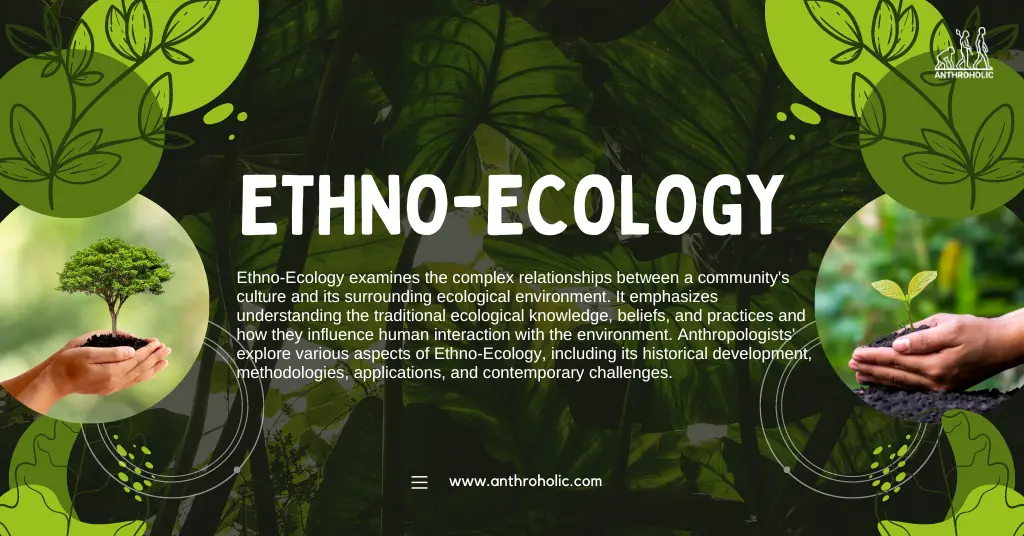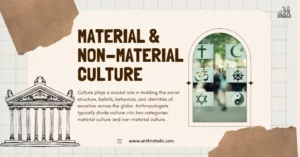AI Answer Evaluation Platform Live Now. Try Free Answer Evaluation Now
Ethno-Ecology
Ethno-Ecology examines the complex relationships between a community’s culture and its surrounding ecological environment [1]. It emphasizes understanding the traditional ecological knowledge, beliefs, and practices and how they influence human interaction with the environment [2]. Anthropologists’ explore various aspects of Ethno-Ecology, including its historical development, methodologies, applications, and contemporary challenges.

Historical Development of Ethno-Ecology
Ancient Roots
Ethno-Ecology has ancient roots, with indigenous communities worldwide possessing a deep understanding of their local ecosystems [3]. Their observations and practices helped shape sustainable living through generations, emphasizing a harmonious relationship with nature.
Modern Exploration
The integration of traditional ecological knowledge into modern scientific practices began in the latter half of the 20th century [4]. Ethnobotanists and anthropologists recognized the value of indigenous wisdom, giving rise to the formal field of Ethno-Ecology.
Methodologies in Ethno-Ecology
Participatory Research
Engaging with local communities through participatory research is essential to understanding their ecological practices and knowledge. This approach values the insights and active involvement of community members.
Comparative Analysis
Comparative analysis involves examining the differences and similarities in ethno-ecological practices across various cultures. It helps in recognizing universal patterns and unique local variations.
Table 1: Common Methodologies in Ethno-Ecology
| Methodology | Description | Application |
|---|---|---|
| Participatory Research | Involves community members in the research process | Widely used |
| Comparative Analysis | Compares ethno-ecological practices across different cultures | Research & Academia |
| Ethnographic Studies | Detailed observation and documentation of cultural practices related to ecology | Field studies |
Applications of Ethno-Ecology
Sustainable Development
Ethno-Ecology plays a critical role in sustainable development by integrating traditional ecological practices into modern environmental management. It offers solutions that are locally relevant and culturally sensitive.
Biodiversity Conservation
The understanding of traditional ecological knowledge contributes to biodiversity conservation by promoting practices that are in harmony with local ecosystems. Indigenous communities often play a vital role in maintaining the ecological balance.
Ethno-Ecology in Practice: Case Studies and Implications
Indigenous Agricultural Practices
The Andean Agroecological System
In the Andes, indigenous communities have developed a complex agricultural system that includes the use of terracing and polyculture. This has allowed for sustainable food production in a challenging environment.
Table 2: The Andean Agroecological System
| Component | Description |
|---|---|
| Terracing | Creation of flat areas on mountain slopes to control erosion |
| Polyculture | Planting multiple crops together to enhance soil fertility |
| Climate Zones | Understanding and utilization of different microclimates |
African Indigenous Pastoralism
African indigenous pastoralists manage livestock in harmony with the environment, employing strategies like rotational grazing to prevent overgrazing. These practices contribute to the sustenance of both human populations and local biodiversity.
Coastal Communities and Fisheries Management
Pacific Island Fishing Traditions
Coastal communities in the Pacific have developed intricate fishing strategies, using local ecological knowledge to manage marine resources sustainably. This includes the recognition of seasonal patterns, tides, and fish behavior.
Forest Management in Indigenous Communities
Amazonian Forest Stewardship
Amazonian tribes practice a diversified management system that includes selective logging, agroforestry, and preservation of sacred sites, promoting forest diversity and resilience.
Integrating Ethno-Ecology into Policy and Education
Policy Implications
The integration of traditional ecological knowledge into policy can lead to more effective and culturally sensitive environmental management. However, it requires careful collaboration between policymakers, scientists, and indigenous communities.
Educational Initiatives
Incorporating ethno-ecology into educational curricula can foster a deeper understanding of ecology and promote the recognition and preservation of indigenous knowledge.
Future Directions and Recommendations
Research and Collaboration
Continued research and collaboration with indigenous communities are essential to further explore the potential applications of ethno-ecology. This can include the development of new methodologies and the documentation of previously unrecognized practices.
Addressing Ethical Considerations
Ethno-ecological research must be conducted with sensitivity to the rights and values of indigenous communities, respecting their intellectual property and cultural heritage.
Enhancing Global Recognition
Building a global recognition of ethno-ecological practices can help preserve and promote this valuable knowledge, contributing to broader environmental sustainability goals.
Conclusion
Ethno-Ecology, as a confluence of traditional wisdom and scientific inquiry, provides invaluable insights into the complex interplay between human societies and their environment. Case studies from various parts of the world illustrate the richness and applicability of this field. However, a conscious and concerted effort is required to ensure that ethno-ecology continues to inform, inspire, and innovate our approach to ecological stewardship.
References
[1] Berkes, F. (1999). Sacred Ecology: Traditional Ecological Knowledge and Resource Management. Taylor & Francis.
[2] Toledo, V. M. (1992). What is ethnoecology? Origins, scope, and implications of a rising discipline. Etnoecológica, 1, 5-21.
[3] Posey, D. A. (1984). A Preliminary Report on Diversified Management of Tropical Forest by the Kayapo Indians of the Brazilian Amazon. Advances in Economic Botany, 1, 112-126.
[4] Nazarea, V. D. (1999). Ethnoecology: Situated Knowledge/Located Lives. University of Arizona Press.




